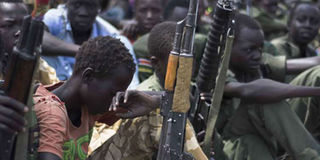Number of child soldiers in South Sudan may rise, says Unicef

Young boys, child soldiers, sitting with their rifles at a ceremony of disarmament, demobilisation and reintegration in Pibor overseen by Unicef and partners on February 10, 2015. Unicef has warned of a spike in the recruitment of child soldiers to fight in South Sudan’s brutal civil war. PHOTO | AFP
What you need to know:
- Last year Unicef helped free 1,775 child soldiers from various armed groups.
- An estimated 650 children have been recruited so far this year.
- The war has been characterised by atrocities committed by those loyal to President Salva Kiir and those fighting for his former deputy Riek Machar.
JUBA
Unicef has warned of a spike in the recruitment of child soldiers to fight in South Sudan’s brutal civil war.
“The different groups are recruiting,” said Justin Forsyth, deputy executive director of Unicef.
“There is a mobilisation going on in some of those remote areas to get people into armed groups because people fear the violence will escalate and they’re taking advantage of that.”
An estimated 16,000 children have been recruited by armed groups — including the national army — since civil war began in December 2013.
Last year Unicef helped free 1,775 child soldiers from various armed groups, but Forsyth warned that fighting which engulfed the capital Juba last month and has thrown a shaky peace deal into doubt would lead to fresh recruitment.
“At this precarious state in South Sudan’s short history, Unicef fears that a further spike in child recruitment could be imminent,” he said.
An estimated 650 children have been recruited so far this year.
VICTIMS OF RAPE
“The dream we shared for the children of this young country has become a nightmare,” Forsyth said, adding that children had been among the many victims of rape, sexual exploitation and abduction as a weapon of war.
The war has been characterised by atrocities committed by those loyal to President Salva Kiir and those fighting for his former deputy Riek Machar. Tens of thousands have been killed and around 2.5 million displaced.
A peace agreement signed in August 2015 has failed to stop the fighting.
In last month’s fighting, Machar’s forces were pushed from the capital to which they had returned under the peace agreement.
Machar fled South Sudan for neighbouring Democratic Republic of Congo and has been replaced in the so-called unity government by a former friend and ally, Taban Deng Gai.
The UN Security Council last week authorised the deployment of 4,000 additional UN peacekeepers with a stronger mandate after a series of failures to protect civilians, including foreign aid workers, from rape and attack. No date has yet been given for when the new force might be deployed.





